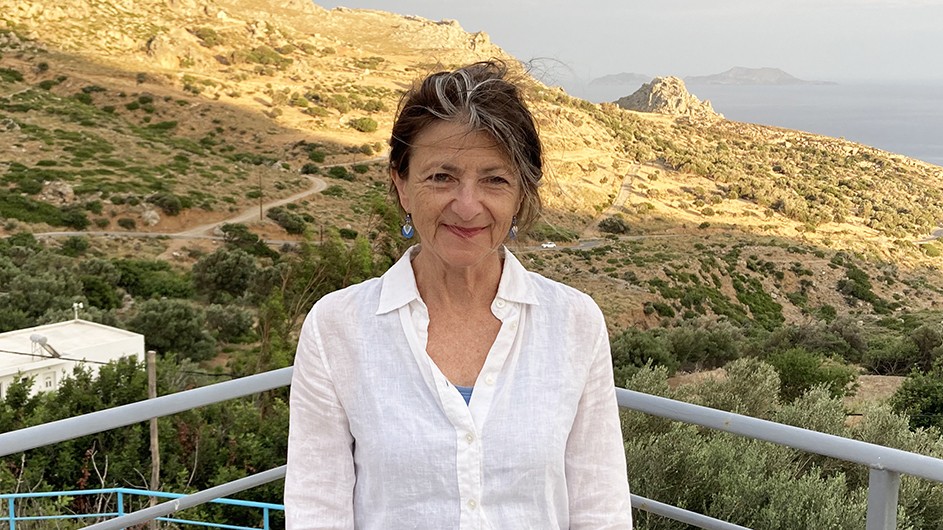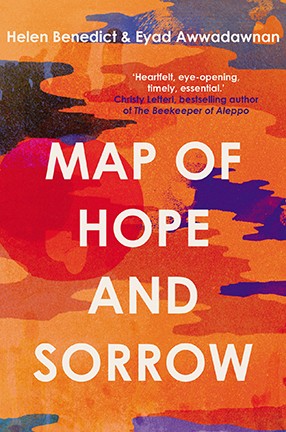A Journalism Professor Profiles Refugees Trapped in Greece
Helen Benedict presents the plight of people from the Middle East and Africa in her new book.

Helen Benedict, a professor at Columbia Journalism School, and her co-writer, Syrian refugee Eyad Awwadawnan, present the stories of five refugees trapped in Greece in Map of Hope and Sorrow. Hasan, Asmahan, Evans, Mursal, and Calvin all endured long, dangerous journeys from the Middle East and Africa to Greece. They each tell their story, tracing the trajectory of their lives from homes and families in Syria, Afghanistan, Nigeria, and Cameroon to the refugee camps in Greece, where they are confined in a hostile environment.
Benedict shares her thoughts on the book with Columbia News, as well as on which writers she admires, and which ones she would like to host at a dinner party.
Why did you write this book?
For most of my career, my novels and nonfiction have been unconnected, but recently that has changed. It began with my writing about the Iraq War. My first book on the subject was The Lonely Soldier in 2010, about American women in the military who had deployed to Iraq. I spent years interviewing veterans but, as open as they were to me, I felt that I could never get inside the heart of what it’s like to be a woman at war the way I can with the imagination one uses in fiction. So I wrote the novel Sand Queen in 2011, about a woman soldier and an Iraqi woman, which developed into a trilogy: Wolf Season and the forthcoming The Soldier’s House.
When I turned to the subject of refugees, I approached it first as a novelist for the same reason—to be able to get inside the heart without exploiting any actual people. Out of that came my forthcoming novel, The Good Deed. But the plight of the people I was meeting was so urgent, I felt I needed to address it more immediately through journalism, too. I wrote several articles about refugees trapped in Greece, and then teamed up with Eyad Awwadawnan, a Syrian writer and refugee I met in the refugee camp on the island of Samos, to write this book.
Map of Hope and Sorrow addresses the injustice with which refugees are being treated across the Western world, and pushes back against the demonizing misinformation that is being used by far right politicians to poison us all against refugees. The best answer to this question comes from the refugees in the book:
“I am telling my story because I want everyone to know what our life was in Syria, and I’m so grateful that anyone is interested. I did not come here to Greece for money. I came because planes and bombs were killing children.”—Asmahan
“It is not easy to talk about what I passed through. It is not easy to remember such painful times. But I want to tell everyone around the world: If you do not like us, it is okay. Not everyone is the same. But if you help and support us, we can show you our humanity and our character. If you look, you will see we are like you.”—Mursal

How did you select the five people whose stories you profile in the book?
It was hard. My co-author, Eyad Awwadawnan, and I both interviewed many amazing people for this book, and it was difficult not to include them all. But length and cost had to be considered, so we tried to include a range of different people from different countries, with different experiences, all of whom could tell their stories with sensitivity, poetry, and wisdom.
We ended up with two Syrians, one a woman, one a man, who each had to flee war and ISIS for different reasons; a young Afghan woman who had to escape death threats from the Taliban with her family; a young gay man from Nigeria who fled homophobic laws and violence; and a political refugee from Cameroon.
What books have you read lately that you would recommend?
The Ungrateful Refugee (a memoir) and Refuge (a novel) by Iranian writer Dina Nayeri; Liberty Walks Naked by Syrian poet Maram al-Masri; Silence Is My Mother Tongue, a novel by Ethiopian writer and refugee, Sulaiman Addonia; and The Beekeeper of Aleppo, a novel by British writer Christy Lefteri.
What's on your nightstand now?
Afterlives by Abdulrazak Gurnah, who won the 2021 Nobel Prize in Literature.
You write fiction as well as nonfiction. Are there other cross-genre writers you admire?
The above-mentioned Dina Nayeri. It is hard to think of anyone who does not cross genres. Ocean Vuong is a poet, memoirist, and novelist who does all forms exquisitely. As for writers who write journalism and fiction, I would start with Charles Dickens, Leo Tolstoy, Mark Twain, and Gabriel Garcia Marquez, and go on to W.E.B. Du Bois, Zora Neale Hurston, Annie Proulx, Joan Didion, James Baldwin, and countless others.
What are you teaching this semester?
I am on leave this term, but normally I teach Writing Social Justice with Style, and Literary Journalism.
You're hosting a dinner party. Which three writers or journalists, dead or alive, would you invite, and why?
The people who have most influenced my writing have been novelists, not journalists, so my dinner party would be with them: Charlotte Bronte, who first awoke me to injustice. Leo Tolstoy, from whom I learned the importance of imbuing every character, no matter how insignificant, with the full complications of being human. James Baldwin, whose essays matter so much, whose novels are exquisite, and because I’d like to see how he gets on with Bronte and Tolstoy.